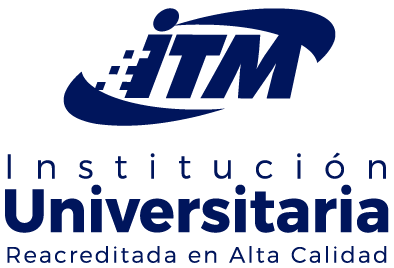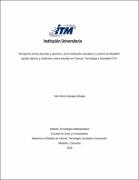Percepción de los docentes y alumnos de la institución educativa La Sierra de Medellín, grados décimo y undécimo, sobre estudios en Ciencia, Tecnología y Sociedad-CTS-
QRCode
Compartir
Fecha
2019Autor(es)
Director(es)
Publicador
Instituto Tecnológico MetropolitanoCitación
Metadatos
Mostrar el registro completo del ítemDocumentos PDF
Resumen
Con la presente tesis se aborda los estudios en Ciencia, Tecnología y Sociedad-CTS-, como enfoque en el escenario mundial, articulado especialmente a las nuevas políticas de Estado hacia un desarrollo integrado del cual se han apropiado las instituciones educativas a nivel mundial y de lo cual Colombia no ha sido la excepción. Su enfoque alude principalmente el factor humano, constituido por la comunidad científica y por las personas que colaboran en pro de dicha actividad. Su perspectiva se ha direccionado, inicialmente desde el factor social conformado por el conjunto de relaciones bien sea en las sociedades, grupos y equipos de trabajo, entre otros. Desde el factor cognitivo, incluye tanto los procesos necesarios para generar los conocimientos teóricos, metodológicos o prácticos, así como los medios informales (conferencias, intercambios de artículos ya publicados) o formales (revistas científicas, manuales) de la comunidad científica. El estudio tiene como objetivo, diagnosticar acerca de las percepciones que tienen los docentes y estudiantes de la I.E. La Sierra, acerca de los estudios CTS, y la forma como vienen diseñado las estrategias pedagógicas para lograr la transversalización del mismo en su modelo educativo y plan curricular articulado al PEI. El estudio de enfoque cualitativo etnográfico, tiene en cuenta los diferentes actores involucrados en el proceso enseñanza y aprendizaje, es decir, aborda la apreciación de alumnos y docentes, a fin de determinar la forma como se ha venido articulando el proceso educativo en cuanto a las estrategias pedagógicas que le permitan a los estudiantes contextualizar, curricularmente, el papel de los estudios CTS, como plataforma trasversal para una formación integral del futuro profesional que demanda el país. Los actores demandan la importancia de promover la investigación en el aula en respuesta a los lineamientos establecidos por el Ministerio de Educación Nacional-MEN-, respecto a la formación por competencias, por lo tanto es necesario emprender un programa de capacitación continua, con el fin que el proceso redunde en formar estudiantes más críticos y con capacidad de análisis, mejorando su rendimiento académico y fomentando su continuidad en los estudios superiores
Abstract
With this thesis the studies in Science, Technology and Society-STS- are approached, as an approach in the world scenario, specially articulated to the new State policies towards an integrated development which the educational institutions have appropriated worldwide and of which Colombia has not been the exception. Its approach alludes mainly to the human factor, constituted by the scientific community and by the people who collaborate in favor of this activity. Their perspective has been addressed, initially from the social factor conformed by the set of relationships, whether in societies, groups and work teams, among others. From the cognitive factor, it includes both the processes necessary to generate the theoretical, methodological or practical knowledge, as well as the informal media (conferences, exchanges of articles already published) or formal (scientific journals, manuals) of the scientific community. The objective of the study is to diagnose the perceptions of teachers and students of the I.E. La Sierra, about the STS studies, and the way in which the pedagogical strategies are designed to achieve the mainstreaming of the same in its educational model and curricular plan articulated to the PEI. The ethnographic qualitative approach study takes into account the different actors involved in the teaching and learning process, that is, it addresses the appreciation of students and teachers, in order to determine the way in which the educational process has been articulated in terms of pedagogical strategies that allow students to contextualize, curricularly, the role of STS studies, as a transversal platform for an integral formation of the future professional that the country demands. The actors demand the importance of promoting research in the classroom in response to the guidelines established by the Ministry of National Education-MEN-, regarding competency-based training, therefore it is necessary to undertake a continuous training program, in order to that the process results in the formation of more critical and analytical students, improving their academic performance and encouraging their continuity in higher education



